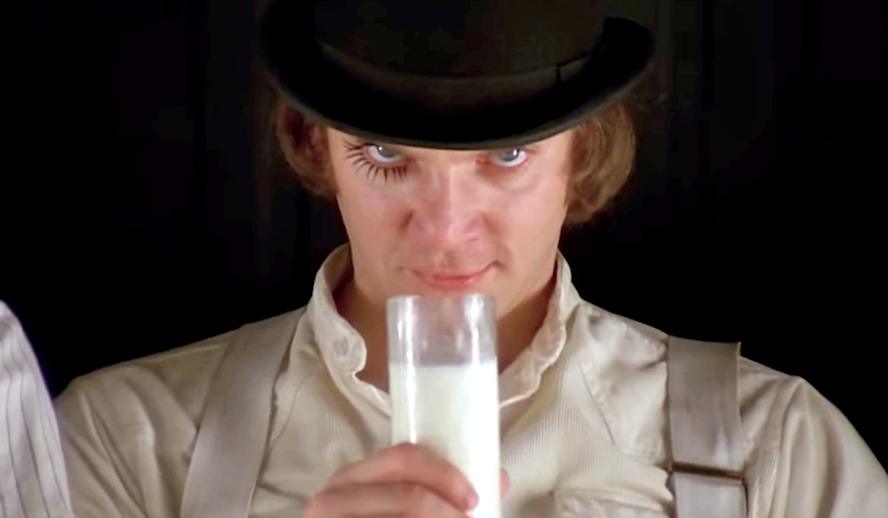Table of Contents

Photo: ‘A Clockwork Orange’/Warner Bros.
“There is a tyranny in the womb of every Utopia.” ― Bertrand De Jouvenel
The chase for a “perfect” society is what colors all of our pursuits. Democracy, constitution, and civil rights are all elements of our efforts to create a society where we have eradicated all evil and undesirable elements. Nevertheless, immoral impulses are an inherent part of the human psyche. Is it ethical to take away something that is a fundamental part of every human, albeit in varying degrees?
A Clockwork Orange (1971) is a cult-classic sci-fi movie about an especially heinous gang leader who agrees to participate in an experimental government program intended to fully rehabilitate societal misfits who exhibit criminal behavior. It is based on the 1962 novel by Anthony Burgess, and written and directed by the great Stanley Kubrick. It stars Malcolm McDowell as Alex, who is an extreme version of a wayward teenager committing “ultra-violence” each night along with his band of misfit friends. Although its release was marred with a lot of controversies due to its explicit expressions of violence and nudity, the movie went on to receive four major nominations at the Oscars, including Best Picture, Best Director, Best Writing, and Best Editing.
Related article: The Top 5 Hitchcock Remakes: Analyzing the Remakes of Master Director Alfred Hitchcock’s Films
Related article: Video: The Evolution Of Johnny Depp – All His Roles & Performances From 1984 to 2021
Stanley Kubrick’s genius colors every element of the movie
The movie is constructed with Kubrick’s signature direction style consisting of long straight-view shots of cavernous sets and interiors. Kubrick uses explicit imagery throughout to drive the depth of Alex’s depravity home via the set design reflecting his lead character’s depraved state of mind. The set design in his house, the milk bar/club, and the cat lady’s house have explicit chaotic imagery everywhere, forcing us to see the world through Alex’s eyes. Kubrick has used the March from “Funeral Music for Queen Mary” by the Philip Jones Brass Ensemble as his underlying score throughout the movie. Such is the iconic nature of the direction of this movie that he has trademarked the shot from the opening scene of Alex’s maniacal expression. In addition to directing it, Kubrick has also written the screenplay. His personal touches are visible in the screenwriting as well: long, seemingly rambling scenes but filled with depth. Since it is set in an imaginative post-Cold War Britain, the dialogue is unlike any common English that exists. It is filled with British slang mixed with Russian with newly coined words such as “malchicks” and “droogs.”
Subscribe to Hollywood Insider’s YouTube Channel, by clicking here.
Kubrick initially had to shelve his interpretation of the novel since he could not find the perfect actor to match his vision. He finally found his Alex after watching Malcolm McDowell’s performance in If… . Malcolm McDowell plays Alex with a blend of attributes, being maniacally scary and eerily childlike at the same time. His performance is instrumental in creating a twisted sense of sympathy for his character in the audience, even after they watch him commit terrible crimes. Kubrick is known for instructing his actors to play up their performances to absurd degrees, to pepper the scenes with a feeling of unease. It can be difficult to find the thin line between fitting exaggeration and absurdly over-the-top. McDowell balances this fine line beautifully throughout the movie.
What does Kubrick want to tell us through ‘A Clockwork Orange’?
The moral implications of the storyline is what Kubrick wants to drive home in the audience. Can you ever really cure a person of immoral thoughts and actions without taking away their free will, which is a fundamental right of a human? What is the line between the right to free will and its forfeiture as a consequence of immoral actions? Going deeper into this philosophical thought, who is the final authority to decide what actions are immoral? In A Clockwork Orange, the government uses a barbaric form of aversion therapy called the “Ludovico Technique,” giving Alex a medication that makes him nauseous while watching tapes of violent and sexual acts. Since the background score of the tapes is Beethoven’s Symphony no. 9, which is also coincidentally Alex’s favorite song, he develops an aversion to it as well. The love of music which was his only saving grace is also taken away from him.
Related article: The Power of Positivity: Ikorodu Bois + Chris Hemsworth + Russo Brothers + Sam Hargrave
Limited Time Offer – FREE Subscription to Hollywood Insider – Click here to read more on Hollywood Insider’s vision, values and mission statement here – Media has the responsibility to better our world – Hollywood Insider fully focuses on substance and meaningful entertainment, against gossip and scandal, by combining entertainment, education, and philanthropy.
The effects of this treatment are overarching. Taking away his impulses to “ultraviolence” has also taken away his ability of self-defense and healthy sexual behavior. The audience watches him struggle to get by in the real world, inadvertently running into the people he had harmed, who enact their revenge unopposed as he cannot defend himself physically anymore. By any general moral standards, anyone would think that he deserves it. Tit for tat, right? However, something feels off here.
The prison chaplain is the only one who understands the moral implications of this experiment as he says: “Choice! The boy has no real choice. Self-interest, the fear of physical pain drove him to that grotesque act of self-abasement. The insincerity was clearly to be seen. He ceases to be a wrongdoer, he ceases also to be a creature capable of moral choice.” If a person does not commit certain acts due to fear of physical pain rather than conquering the source of his impulses, does that mean he is truly “cured”? We use punitive measures to keep society in check, but they do nothing to alter the basic moral code of conduct within each person. One might argue that since the end result is the same, this does not matter (like the doctor). The movie argues that it *does* matter since this is what separates humans from other living species. We are conscious sentient beings and if you take away that freedom of thought and choice, you end up diminishing humanity.
Related article: Hollywood Insider’s CEO Pritan Ambroase: “The Importance of Venice Film Festival as the Protector of Cinema”
Related article: The Masters of Cinema Archives: Hollywood Insider Pays Tribute to ‘La Vie En Rose’, Exclusive Interview with Director Olivier Dahan
The movie forces the audience to deal with a lot of complex emotions towards Alex. They are disgusted by his actions, but they are also disgusted by the treatment he undergoes. The fact that by the logic of a basic Kantian version of morality, he deserved the punishment he got but it somehow still makes the audience uncomfortable implies that there is something incomplete about this way of thought. Kubrick is trying to speak to the inner conscience of people to drive home the point that by doing monstrous things as a punitive measure to a monster, you become a monster too.
How this movie was too ahead of its time
The purpose of the book as well as the movie was to drive home the importance of true free will in society. Anthony Burgess was raised as a Roman Catholic. He wanted to emphasize that truly being a Christian means to forgive people who commit horrible acts, something he had to do himself as his wife was attacked and left physically impaired after being assaulted by American soldiers. It is clear that the writer and his wife in the movie are a metaphor for his own real-life experiences and the prison chaplain represents his interpretation of Christian morals. The message behind the movie is that in pursuit of a utopia based on a one-tone version of morality, we run the risk of crossing the blurry lines ourselves.
However, the movie initially had the opposite effect. The character of Alex inspired a lot of youth to follow in his example and commit heinous crimes as well. After the movie’s release in 1971, there was a rape and a murder whose culprits had cited the movie as an inspiration. While initially of the position that art cannot cause life and it is in fact a mirror to life, the repeated crimes shook Kubrick and made him convince Warner Bros. to pull his movie from distribution in the UK. The ban went on until his death in 1999, after which it was re-released in British theatres.
A Clockwork Orange is an interesting watch if you are a movie fanatic, amateur philosopher or an aspiring sociologist. It will elevate your mind and understanding of societal functioning and will hopefully inspire you to expand your thinking.
Cast: Malcolm McDowell, Patrick Magee, Michael Bates, Warren Clarke
Cinematography: John Alcott | Editor: Bill Butler
Director: Stanley Kubrick | Writers: Stanley Kubrick (screenplay), Anthony Burgess (novel) | Producers: Stanley Kubrick, Max L. Raab, Si Litvinoff
By Mirhan Tariq
Click here to read Hollywood Insider’s CEO Pritan Ambroase’s love letter to Black Lives Matter, in which he tackles more than just police reform, press freedom and more – click here.
An excerpt from the love letter: Hollywood Insider’s CEO/editor-in-chief Pritan Ambroase affirms, “Hollywood Insider fully supports the much-needed Black Lives Matter movement. We are actively, physically and digitally a part of this global movement. We will continue reporting on this major issue of police brutality and legal murders of Black people to hold the system accountable. We will continue reporting on this major issue with kindness and respect to all Black people, as each and every one of them are seen and heard. Just a reminder, that the Black Lives Matter movement is about more than just police brutality and extends into banking, housing, education, medical, infrastructure, etc. We have the space and time for all your stories. We believe in peaceful/non-violent protests and I would like to request the rest of media to focus on 95% of the protests that are peaceful and working effectively with positive changes happening daily. Media has a responsibility to better the world and Hollywood Insider will continue to do so.”
Vote with a conscience – Register to Vote – Your vote saves lives and ends systemic racism
Ways to support Black Lives Matter Movement to end systemic racism
More Interesting Stories From Hollywood Insider
– Want GUARANTEED SUCCESS? Remove these ten words from your vocabulary| Transform your life INSTANTLY
– Compilation: All James Bond 007 Opening Sequences From 1962 Sean Connery to Daniel Craig
– Do you know the hidden messages in ‘Call Me By Your Name’? Find out behind the scenes facts in the full commentary and In-depth analysis of the cinematic masterpiece
– A Tribute To The Academy Awards: All Best Actor/Actress Speeches From The Beginning Of Oscars 1929-2019 | From Rami Malek, Leonardo DiCaprio To Denzel Washington, Halle Berry & Beyond | From Olivia Colman, Meryl Streep To Bette Davis & Beyond
– In the 32nd Year Of His Career, Keanu Reeves’ Face Continues To Reign After Launching Movies Earning Over $4.3 Billion In Total – “John Wick”, “Toy Story 4”, “Matrix”, And Many More
A Clockwork Orange, A Clockwork Orange, A Clockwork Orange, A Clockwork Orange, A Clockwork Orange, A Clockwork Orange, A Clockwork Orange, A Clockwork Orange, A Clockwork Orange, A Clockwork Orange, A Clockwork Orange, A Clockwork Orange, A Clockwork Orange, A Clockwork Orange, A Clockwork Orange, A Clockwork Orange, A Clockwork Orange, A Clockwork Orange, A Clockwork Orange, A Clockwork Orange, A Clockwork Orange, A Clockwork Orange, A Clockwork Orange, A Clockwork Orange, A Clockwork Orange, A Clockwork Orange, A Clockwork Orange, A Clockwork Orange, A Clockwork Orange

Mirhan Tariq is a writer who grew up in Kuwait and she learned about the outside world through the magic of movies. She believes that art is supposed to expand our world view, help us develop critical thinking, and teach us something worthwhile. She watches movies and TV shows with a critical eye – judging its moral, cultural, political and philosophical implications, and delivering her observations in her pieces for Hollywood Insider, aligning with our mission of focusing on meaningful entertainment.








